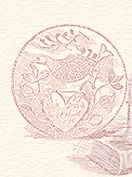Ihr liewe Leit:
Mer mache heit weider middem Parre Schantz seim Schtick aussem
dridde Yaahrbuch vun der Pennsylvaanisch Deitsch Gesellschaft (1893):
En paar Daag sin vergange, noh hot der Parre der Mann aagedroffe,
der die Arrigel so wolfel kaaft ghatt hot. Es waare noch annere Leit bei ihm.
Der Parre hot zu ihm gsaat, "Ich deet gleiche dei nei…" Der Mann hot graad
neigschwetzt, "Parre, ich hab alleweil ken Zeit mit dir zu schwetze," un iss
graad fattgeloffe.
Der Parre hot en paar Daag gewaardt, noh waar er emol imme Schtor.
Der Mann der die Arrigel kaaft hot iss aa neikumme. Der Parre iss zu ihm gange
un hot gsaat, "Hoscht du nau Zeit mir die neii Arrigel zu weise?" Er hot der
Parre aardlich aageguckt un hot gsaat, "Witt du sie sehne?" "Ya," saagt der
Parre, "ich deet gleiche sie zu sehne." "Dann kumm mit mir, ich will dir sie
weise," saagt der Mann. Er hot awwer der Parre net in sei Haus genumme. Er hot
der Parre in der zwett Schtock genumme, du waar ebbes vumme Schreinerschapp.
Der Mann hot dann zum Parre gsaat, "Do leit ee Deel vun der Arrigel -
datt sin Schticker vun der Kees - un do sin die Glaffe - datt iss der
Bloossballig." "Ei, ei," saagt der Parre, "war hoscht du dann mit der Arrigel
geduh?" "Denkscht du Ich wott gehambackt sei?" saagt der Mann. "Ich hab die
Arrigel mit em Haetschet veschlaage." "Warum hoscht du dann des geduh?' saagt
der Parre. "Waar sie dann net gut, hot mer dann net druff schpiele kenne?"
Dann saagt der Mann, "Mer hot's Windbumbe gheert, eb mer die Musick
gheert hot, un noh hot sie nuscht (yuscht) wie die yunge Hinkel, 'Bieps, bieps,'
gemacht. Ich hett net gehambackt sett wolle. Ich hab sie verschlaage mit dem
Haetschet. Wu ich die Arrigel aerscht grickt hab, do hawwich sie in de Parlor
geschtellt. Mei Fraa iss reikumme, un wu sie gheert hot wie die Arrigel gange
iss, do hot sie gsaat, "Ich denk du bischt gehambackt warre."
Mundaags hab ich un en Bu sie do ruff gedraage, un do hawwich sie
mit em Haetschet gfixt. Ich hab meiner Fraa gsaat ich hett die Arrigel getuunt.
Noh hot sie mich gfroogt eb ich sie mit em Haetschet verschlaage hett. Ich hab
ihr gsaat wann sie Kindling hawwe wott, dann kann sie im Schapp griege, ich
hett die Arrigel zammegschlaage.
Der Parre hot der Mann gedauert, awwere doch waar er froh ass er es
viel besser afforde hot kenne, die elf Daaler zu verliere, wie villeicht en
mancher aarremer Mann. Die Experienz waar gut fer der Mann, un fer viel annere
die devun gheert hen.
Macht's gut,
Der Alt Professer
|
Dear people:
We will continue today with Pastor Schantz's piece from the third
yearbook of the Pennsylvania German Society (1893):
A few days passed, then the pastor met the man who had bought the
organ so cheaply. There were other people with him. The pastor said to
him, "I would like to see your new …" The man just interrupted him,
"Pastor, I have a this moment no time to talk to you," and just walked
away.
The pastor waited a few days, then he was once in a store. The man who
had bought the organ also came in. The pastor went to him and said, "Do
you now have time to show me the new organ?" He looked at him
seriously/steadily and said, "Do you want to see it?" "Yes," says the
pastor, "I would like to see it." "Then come with me, I want to show it to
you," says the man. But he did not take the pastor into his home. He took
the pastor up into the second floor, there was something there like a
carpenter's/cabinet maker's shop.
The man then said to the pastor, "Here lies one part of the organ-there
are pieces of the case-and here are the keys-there are the bellows." "Ei,
ei," says the pastor, "what did you do with the organ?" "Do you think I
wanted to be swindled?" says the man. "I broke the organ to pieces with
the hatchet." "Why did you do that?" says the pastor. "Wasn't it any good,
couldn't one play on it?"
The man says, "One could hear the bellows blowing air before one heard
the music, and then it just made noises like young chickens, 'Beep, beep.'
I didn't want to be swindled. I broke it to pieces with the hatchet. When
I first got the organ, I put it up in the parlor. My wife came in, and
when she heard how the organ was going, she said, "I think that you were
swindled."
On Monday I and a boy carried it up here, and I fixed it with the
hatchet. I told my wife that I had tuned the organ. Then she asked me if I
had knocked it to pieces with the hatchet. I told here that if she ever
wanted kindling wood, then she could get it in the shop, I had knocked the
organ to pieces.
The pastor felt sorry for the man, but never-the-less he was happy that
the man could better afford to lose the eleven dollars that perhaps many a
poor man. The experience was good for the man, and for many others who
heard about it.
Take care,
The Old Professor
|













